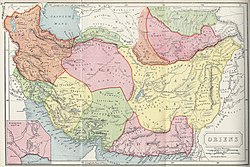
Back Ariane (Pers) Breton Ariana Catalan Ariana (Region) German Αριανή Greek Ariana (región) Spanish آریانا Persian Ariana ID Ariana (kraina historyczna) Polish آریانا (علاقہ) PNB آريانا Pashto/Pushto
Ariana
Ἀρ(ε)ιανή (Greek) | |
|---|---|
 Map of Ariana (yellow) among the historic Iranian regions, based on descriptions by Eratosthenes of Cyrene. Published in the Atlas of Ancient and Classical Geography by Samuel Butler and Ernest Rhys, 1908. | |
| Countries | |
| Languages | Various Indo-European, Turkic, and Mongolic |
| Named for | Arya (Indo-Iranians) |
In the Greco-Roman world, Ariana was a geographical term referring to a general area of land between Central Asia[1] and the Indus River.[2] Situated far to the east in the Achaemenid Empire,[3] it covered a number of satrapies spanning what is today the easternmost parts of Iran, the entirety of Afghanistan, and the westernmost parts of Pakistan.[4][5] "Ariana" is Latinized from Greek: Ἀρ(ε)ιανή Ar(e)ianē [region]; Ἀρ(ε)ιανοί Ar(e)ianoi [demonym].[6] The Greek word, in turn, is derived from the term Airyanem (lit. 'Land of the Aryans') in Old Persian.
During several periods of history, Ariana was governed by the Persians, such as the Achaemenids, the Kushano-Sasanians, and the Sasanians. Other significant rulers were, namely, the Greeks and the Indians, such as the Macedonians, the Seleucids, the Mauryas, the Greco-Bactrians, the Indo-Greeks, the Indo-Scythians, and the Parthians (incl. the Kushans and the Indo-Parthians). A historic presence was also established in parts of Ariana by various Huna peoples and other Central Asian nomads, such as the Xionites (incl. the Kidarites and the Hephthalites).
- ^ Smith, William (1980). "Ariana". Dictionary of Greek and Roman Geography. Boston: Little, Brown, and Co. pp. 210–211. Retrieved 2013-05-10.
- ^ Schmitt, R. (1986). "Aria". Encyclopaedia Iranica. Retrieved 2013-05-10.
- ^ Lewis, Charlton T.; Short, Charles. "Ărĭāna". A Latin Dictionary. Perseus Digital Library. Retrieved 2013-05-10.
- ^ The Columbia Encyclopedia, Sixth Edition, 2008
- ^ Sagar, Krishna Chandra (1 January 1992). Foreign Influence on Ancient India. Northern Book Centre. p. 91. ISBN 9788172110284.
According to Strabo (c. 54 B.C., A.D. 24), who refers to the authority of Apollodorus of Artemia, the Greeks of Bactria became masters of Ariana, a vague term roughly indicating the eastern districts of the Persian empire, and of India.
- ^ Pliny, Naturalis Historia, book vi, page 23
© MMXXIII Rich X Search. We shall prevail. All rights reserved. Rich X Search